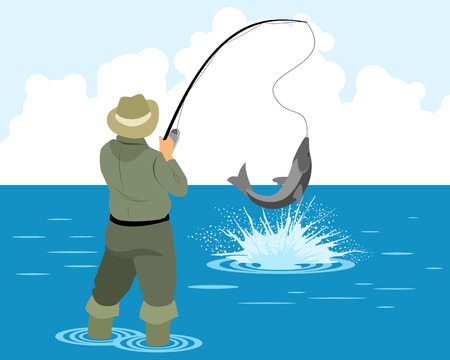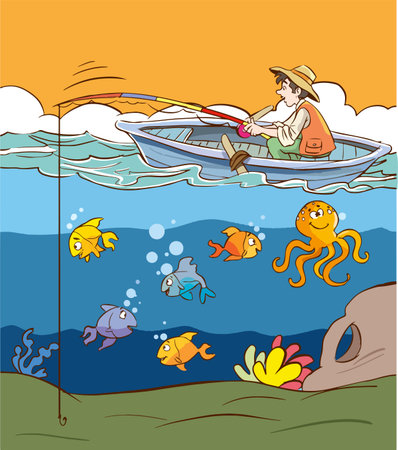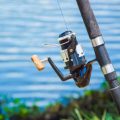Essential Fishing Gear for Beginners
When you’re new to fishing, having the right gear is half the battle. Every beginner angler should start with a solid foundation of essentials that make the experience smoother and more enjoyable. First up, you’ll need a reliable fishing rod and reel combo. Look for something lightweight and versatile—spinning rods are great for most freshwater situations and are easy to handle. Next, a sturdy tackle box is a must-have for keeping your hooks, lures, sinkers, and other small gear organized. Don’t forget about fishing line; monofilament is user-friendly and forgiving for those just getting started. Add some basic hooks in a variety of sizes, a selection of bobbers, and a few proven lures like soft plastics or spinnerbaits. These core items will cover most fishing scenarios you’ll encounter at local lakes or rivers across the U.S., setting you up for success from your very first cast.
Top Fishing Gadgets That Make a Difference
When you’re just starting out, the right fishing gadgets can make your time on the water a whole lot easier—and a lot more fun. Today’s beginner-friendly tech tools take the guesswork out of fishing and help you focus on what really matters: enjoying the great outdoors and landing your first catch. Here are some user-friendly gadgets that every new angler should consider:
Must-Have Tech Tools for Beginner Anglers
| Gadget | Main Benefit | Why It’s Great for Beginners |
|---|---|---|
| Electronic Bite Alarms | Instantly alerts you when a fish bites | No need to constantly watch your rod—ideal for learning patience and timing |
| Portable Fish Finders | Helps locate fish with sonar technology | Makes it easier to find fish even if you don’t know the waters well |
| Smart Scales | Weighs and records your catch digitally | Simple way to track progress and share results with friends or online groups |
How These Gadgets Simplify Your Experience
Electronic bite alarms are perfect for beginners who may not yet recognize subtle nibbles. Just set them up on your rod, and they’ll sound off when there’s action, so you don’t miss a thing. Portable fish finders, often as easy to use as casting out a bobber, use sonar to show where fish are swimming—no more blind guessing or endless waiting. And with smart scales, weighing your catch is accurate and effortless, usually syncing with an app so you can keep a record of your big (or small) moments. All these gadgets work together to boost your confidence and help you learn faster without feeling overwhelmed.

3. Smart Storage Solutions on the Water
When you’re just starting out with fishing, staying organized and protecting your gear from the elements is key to a successful day on the water. That’s where smart storage solutions come into play. Whether you’re casting from the bank of a local river or heading out on a boat, having the right bags and organizers can make all the difference.
Fishing Backpacks: Hands-Free Convenience
A quality fishing backpack is a beginner’s best friend. Look for one with multiple compartments so you can separate your tackle, snacks, extra clothes, and even a hydration pack. Many packs designed for anglers feature built-in rod holders, making it easy to hike to remote spots without juggling your gear. The padded straps are a must for comfort during long treks, and some even include waterproof bases to set your pack down worry-free.
Waterproof Dry Bags: Keeping Your Essentials Safe
No one wants soggy sandwiches or waterlogged electronics. A waterproof dry bag is a simple but essential piece of kit for any beginner. Roll-top closures ensure that rain or splashes stay out, so your phone, wallet, spare clothing, and important papers remain bone-dry. Choose a size that fits your needs—small for valuables or larger ones if you’re packing extra layers or food for an all-day adventure.
Organizers: Fast Access When It Counts
Digging through a tangled mess of lures and lines can quickly kill the vibe when fish are biting. Compact tackle boxes or modular organizers let you sort hooks, sinkers, jigs, and soft plastics by type or size. Some options are waterproof and float if dropped overboard—perfect for beginners prone to accidental slips. Magnetic trays or zippered pouches can also help keep everything sorted and close at hand.
Pro Tip:
Invest in gear with reflective strips or high-visibility colors. Not only will this help you find your stuff quickly at dawn or dusk, but it’s also safer if you’re wading or fishing from shore after dark.
Conclusion
With reliable storage solutions like backpacks, dry bags, and handy organizers, new anglers can focus on learning the ropes instead of worrying about lost or damaged gear. Stay organized and prepared so every fishing trip starts—and ends—on a high note.
4. Safety Accessories for First-Time Anglers
When you’re just starting out with fishing, it’s easy to get caught up in the excitement of new rods and tackle boxes. However, safety should always come first—especially if you’re heading out on the water for the first time. Here are some must-have safety accessories every beginner angler should pack before their next trip:
Essential Safety Gear Checklist
| Accessory | Why It’s Important | Pro Tips |
|---|---|---|
| Polarized Sunglasses | Protects your eyes from UV rays and reduces glare on the water, making it easier to spot fish and hazards. | Choose a pair with sturdy frames and opt for lenses that enhance contrast in low light conditions. |
| Life Vest (PFD) | Keeps you afloat in case of unexpected falls into the water—an absolute must for beginners and kids. | Look for a U.S. Coast Guard-approved vest that fits snugly but comfortably. |
| First Aid Kit | Helps you quickly deal with minor injuries like cuts from hooks or slips on wet rocks. | Include waterproof bandages, antiseptic wipes, tweezers, and pain relievers. |
The Importance of Safety While Fishing
No catch is worth risking your well-being. Polarized sunglasses don’t just make it easier to see fish—they also shield your eyes from sharp hooks and branches. Life vests are non-negotiable when fishing from a boat, kayak, or even a dock if you aren’t a strong swimmer. And accidents happen fast; having a well-stocked first aid kit ensures you’re ready for anything from bug bites to minor scrapes.
Other Handy Safety Items
- Sunscreen: Prevents painful sunburn during long hours outside.
- Bug Spray: Protects against ticks and mosquitoes common near water.
- Whistle or Signal Device: For calling attention in case of emergency.
- Multi-tool: Useful for cutting lines, removing hooks, or basic repairs.
Quick Tip:
If you’re fishing in a remote area, let someone know your plans and expected return time. A little preparation goes a long way in making sure your first fishing adventure is both fun and safe!
5. Helpful Accessories for a Better Fishing Experience
When you’re just starting out with fishing, the right accessories can make all the difference between an average day and a fantastic one. Beyond the basic rod and reel, there are a few handy extras every beginner should consider packing for their trip. These tools boost your comfort, convenience, and overall enjoyment on the water.
Multi-tools: Your All-in-One Sidekick
A good multi-tool is like having a fishing buddy who’s always prepared. Look for one that includes pliers, scissors, a knife, and screwdrivers. These tools will help you handle hooks, cut line, open bottles, or fix small gear problems without searching through your tackle box. Brands like Leatherman or Gerber are popular choices among American anglers for their durability and reliability.
Comfortable Seating: Take a Load Off
If you plan to fish from the shore or dock, a sturdy folding chair can save your back and legs during long sessions. Opt for portable camp chairs with built-in cup holders and storage pockets to keep your essentials within reach. For kayak or boat anglers, padded seat cushions provide extra comfort for those all-day outings.
Rod Holders: Fish Hands-Free
Rod holders free up your hands for tasks like baiting hooks or enjoying a snack while waiting for the next bite. Bank anglers often use ground-spike holders, while boaters and kayak anglers prefer clamp-on versions that attach securely to your craft. Rod holders keep your setup organized and reduce fatigue—plus, they’re super useful if you want to fish with more than one rod at a time.
Other Smart Extras
Don’t forget about little comforts and safety items like polarized sunglasses (for glare reduction), hats for sun protection, portable coolers for snacks and drinks, and waterproof phone cases. Each of these add-ons makes your fishing adventure smoother and more enjoyable—just what you need as a beginner learning the ropes.
Summary
Investing in these helpful accessories ensures you spend less time struggling with gear and more time enjoying the outdoors. Start simple but smart; it’s all about making each trip easier, safer, and a lot more fun.
6. Tips for Choosing the Right Fishing Accessories
When youre just starting out, picking the right fishing accessories can feel overwhelming with all the options on the market. Here’s how to make smart choices that fit your needs and budget.
Focus on Quality Over Quantity
It’s tempting to grab a bunch of gadgets, but quality matters more than quantity. Invest in durable essentials like a reliable pair of pliers, a sharp fillet knife, and a sturdy tackle box. Look for trusted American brands or products with solid reviews from local anglers—these are often built to last and withstand tough outdoor conditions.
Match Gear to Your Local Fishing Spots
Your location should influence what you buy. Are you fishing in freshwater lakes, slow-moving rivers, or saltwater piers? For example, if you’re in Florida targeting redfish along the coast, you’ll need different lures and line strength than someone casting for trout in Colorado streams. Talk to local bait shops or join area fishing forums—they’re gold mines for advice about what works best where you fish.
Consider Versatility
Choose gear that can handle multiple situations. Multi-tool knives, adjustable rod holders, and versatile tackle packs save space and money while covering more ground on different waters.
Stay Within Budget
You don’t have to break the bank to get started. Set a spending limit before you shop and stick to it. Consider buying used gear at local outdoor swap meets or checking out big-box store sales during holiday weekends—Americans love a good deal! Prioritize essential items first; fancy electronics can wait until you gain experience.
Test and Learn as You Go
Finally, don’t stress about getting everything perfect the first time. Borrow from friends or rent equipment before making bigger purchases. As you spend more time on the water, youll figure out what works best for your style and favorite spots—and that’s how you build a kit that truly fits your needs.


